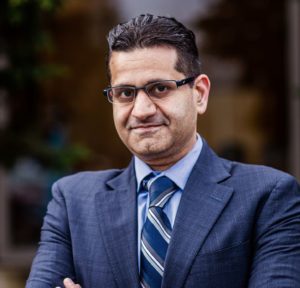Message from Arpan Waghray, M.D., CEO, Providence's Well Being Trust

We recognized the strength of empowering our frontline caregivers to identify the needs of our patients and communities, and in response to the pressing challenges our communities face, we launched more than 20 programs that directly address our communities’ greatest mental health needs.
And we set an audacious goal to expand access to mental health care to 1 million people in the Western U.S. by 2026.
In this report, we are sharing updates about our grant initiatives that are helping to expand timely access, enhance quality care, and improve mental health and resilience – especially for the poor and vulnerable and those most marginalized in society.
Read Dr. Waghray’s full message in Providence’s Well Being Trust 2023 Annual Report.
Board Chair Message
Mental Health Advocacy

Through our commitment to driving change and meeting our communities’ greatest mental health needs, Providence’s Well Being Trust awarded nearly $5 million in grants to new initiatives that address a range of mental health concerns.

better serve our communities.
This work includes Providence’s state and federal behavioral health advocacy efforts. Our behavioral health advocacy priorities are categorized into three areas:
- Increasing access to mental health services.
- Increasing the affordability of mental health services.
- Improving quality care.
Read message from Ali Santore, MPA, EVP & Chief Administrative Officer, Providence.
Impact Stories
Improving Caregiver Mental Health and Well-Being: How Providence is Redefining
Support for Health Care Workers


Surgeon General Dr. Vivek Murthy has declared health worker burnout and well-being as crisis of national priority, and the Centers for Disease Control and Prevention (CDC) reported that health workers are feeling fatigue, loss, and grief at higher levels than before the pandemic. The CDC data also showed that supportive workplaces can make a big difference in caregiver well-being. Providence’s No One Cares Alone (NOCA) program responds to this call to action by providing caregivers with resources and support, meeting them wherever they are on their wellness journey.
NOCA takes a public health approach to addressing mental health. Core Leader Outreach is a key component of this approach, that focuses first on supporting leaders.

-Andrew Daly, Licensed Clinical Social Worker

-Brian Johnson, Chaplain and Wellness Consultant
Expanding Access: St. Jude Heritage Medical Clinics Introduce Integrated Mental Health Care for Children and Youth
With support from a grant from Providence’s Well Being Trust, St. Jude Heritage Medical Clinics were able to expand an integrated collaborative care model bringing together physical, behavioral, and mental health care in one place by adding an additional behavioral health therapist to their pediatric clinic.

Bringing mental and physical health care together in an integrated way results in better outcomes for children and youth, more efficient and coordinated care, higher
treatment rates, reduced parental stress, and improved patient satisfaction.
Integrated Behavioral Health: Positive Patient Outcomes Seen as Kadlec Clinics Introduce Integrated Behavioral Health Model in Primary Care Clinic
Nestled between the Columbia and Yakima Rivers, Kadlec Regional Medical Center serves the local communities and the wider rural area across southeastern Washington and northeastern Oregon. As is the case for many regional referral centers serving expanded rural areas, medical access can be increasingly spread thin – especially for behavioral health care and support.

The Kadlec Integrated Behavioral Health Expansion project, funded through
a grant from Providence’s Well Being Trust, is expanding access to behavioral
health care by embedding licensed social workers in primary care clinics.

on patients. By taking this collaborative, integrative approach, it really helps us as clinicians to meet patients where they’re at and empower them to make long-lasting changes in their lives. And that’s, ultimately, what it’s all about.” – Nathan Davis, LICSW
Mental Health Therapist, Kadlec Clinic Richland Primary Care
Virtual mental health support cultivates hope and fosters resilience for youth and families

As part of its ongoing commitment to improve youth mental health and well-being, in 2023 Providence announced that it would fund – through Providence’s Well Being Trust – Renton School District’s student virtual mental health services over the next three years. This commitment is a key component of the Providence and Seattle Sounders FC unprecedented community partnership to address the youth mental health crisis.
Through this new partnership, the 15,000-plus Renton School District students have access to mental health services and support including:
- Tele-mental health therapy on campus as well as from their homes.
- Mental health awareness curriculum and outreach that fosters a culture to help kids prioritize their mental well-being and support their friends.
- In-person and virtual events and assemblies using the Work2BeWell (W2BW)
curriculum. - Safe spaces for kids to play.
High-tech Support AI-enabled digital assistant provides high-tech support for behavioral health education and referrals

About 40% of office visits for mental health concerns occur in primary care, and the trusted relationship with the primary care physician creates a strong opportunity for whole-person care. However, studies show that primary care providers don’t always feel equipped with the time or support needed to adequately address these needs. Providence built MedPearl, an AI-enabled system that provides clinical guidance at the point of care, as an education and referral platform integrated into its electronic health record to better support physicians. A grant from Providence’s Well Being Trust is increasing behavioral health resources within the tool to meet growing demands.

support primary and urgent care physicians and APPs to have better conversations and makes sure that when they refer out to specialists, they are referring appropriately, with the right work-up in the exam rooms – virtual and physical.”
– Teri Renfrow, Director, MedPearl, Virtual Care and Digital Health

-Tom Rittman, M.D., Psychiatrist & Medical Director, Behavioral Health. Providence St. Vincent Medical Center, Oregon
Work2BeWell National Student Advisory Council members develop new state-by-state youth mental health resource

The National Student Advisory Council (NSAC) of Work2BeWell has created a new, free state-by-state Mental Health Resource, which is designed to serve teens across the country as a hub for improving and maintaining mental health. Specific resources, which include hotlines and contact information for local mental health organizations, are available for all 50 states.
Two council members, Shreeya Gogia and Kianna Victor, were key leaders in the development of the resource.

step toward them taking the initiative to improve their mental health.”
– Kianna Victor, NSAC Alum

their communities and residents need.”
– Shreeya Gogia, NSAC member






